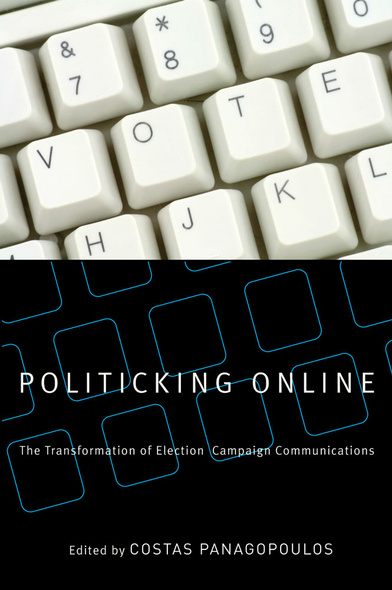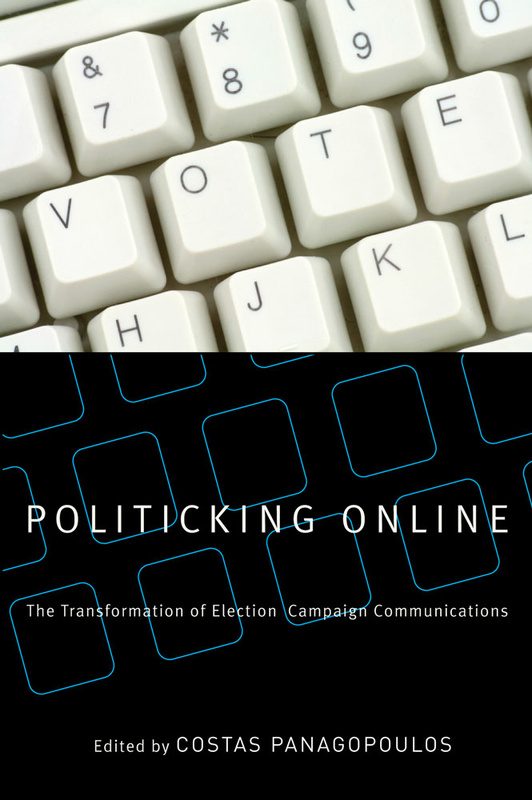Politicking Online
The Transformation of Election Campaign Communications
Edited by Costas Panagopoulos
Rutgers University Press
Of the many groundbreaking developments in the 2008 presidential election, the most important may well be the use of the Internet. In Politicking Online contributors explorethe impact of technology for electioneering purposes, from running campaigns andincreasing representation to ultimately strengthening democracy. The book reveals how social networking sites such as MySpace and Facebook are used in campaigns along withe-mail, SMS text messaging, and mobile phones to help inform, target, mobilize, and communicate with voters.
While the Internet may have transformed the landscape of modern political campaigns throughout the world, Costas Panagopoulos reminds readers that officials and campaign workers need to adapt to changing circumstances, know the limits of their methods, and combine new technologies with more traditional techniques to achieve an overall balance.
A very valuable addition to the literature on political campaigns and communications, serving an important role in addressing the intersection of technology and human behavior.
Politicking Online is a comprehensive, thoughtful, and idea-provoking survey of the current state of political communication on the Internet and other new media venues...A useful reference for the scholar and student as well as a very informative read for citizens in our rapidly evolving e-democracy.
Panagopoulos has assembled 16 original studies that explore how some of the political campaigns of 2008 adapted to and used the Internet as a tool to inform, target, and mobilize volunteers, contributors, and voters. The most innovative aspects of this anthology are the four essays that discuss how blogs and social networking sites were utilized in campaigns. Overall, this innovative text provides a solid foundation for understanding how new technology is influencing political campaigns. Highly recommended.
These contributions help us better understand the many different ways the web is leaving its mark on politics. Politicking Online is recommended reading for scholars and students of American politics, electorial campaigns and political communication, and a valuable addition to existing scholarship on the Web and politics. The findings should be thought-provoking and raise new questions as we conduct democacy during an ongoing technological revolution.
Costas Panagopoulos is an assistant professor of political science and director of the Center for Electoral Politics and Democracy and the Master's Program in Elections and Campaign Management at Fordham University. He has provided political analysis for the New York Times, the Los Angeles Times, USA Today, CBS, NBC, and CNN.
Preface and Acknowledgments
Technology and the Modern Political Campaign
Part I: Candidate Websites
The Technological Development of Candidate Websites
Closing Gaps, Moving Hurdles
Trickle-Down Technology?
Do Campaign Websites Really Matter in Electoral Civic Engagement?
Part II: Technology and Voter Mobilization
Clicking for Cash
The Impact of Email Campaigns on Voter Mobilization
Mobilizing the Mobiles
Online Political Advertising
Part III: International Perspectives
"Under Construction"
Mobile Democracy
Part IV: The Latest Developments
Bloggers at the Gates
Voters, MySpace, and YouTube
"Friend" the President
The Political Impact of Facebook
Conclusion
Notes on contributors
Index
Technology and the Modern Political Campaign
Part I: Candidate Websites
The Technological Development of Candidate Websites
Closing Gaps, Moving Hurdles
Trickle-Down Technology?
Do Campaign Websites Really Matter in Electoral Civic Engagement?
Part II: Technology and Voter Mobilization
Clicking for Cash
The Impact of Email Campaigns on Voter Mobilization
Mobilizing the Mobiles
Online Political Advertising
Part III: International Perspectives
"Under Construction"
Mobile Democracy
Part IV: The Latest Developments
Bloggers at the Gates
Voters, MySpace, and YouTube
"Friend" the President
The Political Impact of Facebook
Conclusion
Notes on contributors
Index








